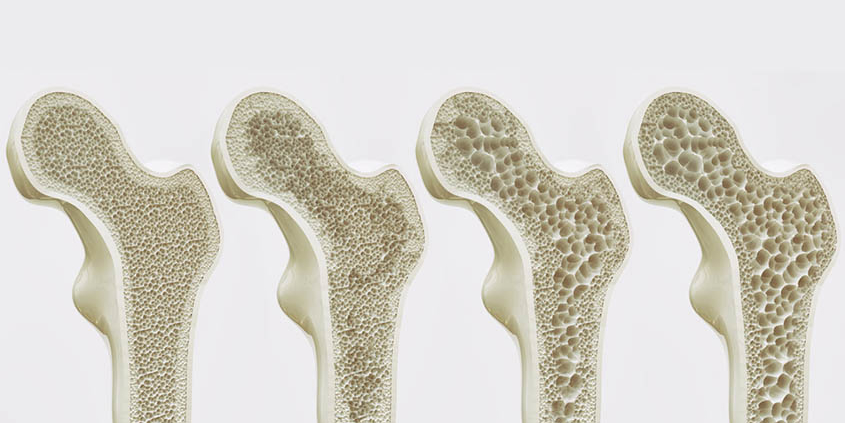How to live a bone healthy lifestyle during menopause
Every October, a spotlight is shone on the menopause and peri-menopause and the focus for 2021’s World Menopause Day is bone health.
Bone is living tissue with its own blood and nerve supply and healthy bone renews itself continually. The amount of bone tissue you have can be measured and this gives us a bone mineral density score. From your late 30s, this will naturally start to decrease, eventually making your bones weaker and more susceptible to fracture. Women’s bone density reduces more quickly after menopause, as low or no oestrogen leads to reduced rates of new bone cell formation.
Oestrogen is an important hormone for maintaining bone density, and reduced oestrogen levels result in old bone cells breaking down faster than the body can grow new bone tissue. The average decrease in bone mass density during the menopausal transition is estimated to be 10% and this can mean that some women are losing even rapidly, perhaps as much as 20%.
Why does bone health matter?
Our bones support us and help us to keep moving. They protect our brain, heart, lungs, and other organs from serious injury. They contain bone marrow that grows blood cells, and they store important minerals, such as calcium and phosphorous, which can be utilised by our body when we need them.
Osteoporosis, the progressive condition whereby our bones become more fragile and less dense, is thought to affect around 3 million people in the UK. More women than men are affected, in a ratio of 4:1. One in two women over the age of 50 will break a bone at some stage in their lives.
To support this year’s focus on bone health, the International Menopause Society commissioned two leading experts in osteoporosis and the menopause to propose practical management strategies.
Entitled ‘Update on bone health: the International Menopause Society White Paper 2021’ written by T. J. de Villiersa and S. R. Goldstein, part of the focus was on bone-friendly lifestyle measures.
This includes “optimization of calcium and vitamin D status, appropriate exercise, cessation of tobacco smoking and the abuse of alcohol, and the avoidance of bone-toxic medication.
“The IMS recommends that menopausal hormone therapy (MHT) be considered in women at risk of fracture before the age of 60 or within 10 years after menopause. This recommendation is based on the risk reduction seen in all fractures in the Women’s Health Initiative study and a favourable benefit/risk ratio in the younger woman.”
How to boost bone health during the menopause?
Dr Tickle can advise you on how to adopt a bone-friendly lifestyle during this period of transition and beyond. This can include the following:
- Exercise can help alleviate many menopause symptoms and strength training in particular is highly beneficial for promoting bone density. Numerous studies have shown that it can not only slow down bone loss but even help to rebuild bones
- Optimise your dietary intake of calcium by eating foods such dairy products and green leafy vegetables
- Check your vitamin D levels, as a vitamin D deficiency can be addressed with supplements
- Avoid smoking as it slows down the bone renewal process – the good news is that the moment you give up smoking, your risk of fracture begins to return to normal
- Limit alcohol consumption as this also reduces the rate of bone renewal.
- Consider reduction of caffeine intake as this reduces the body’s ability to absorb calcium.
HRT can also be highly beneficial for women for this reason. “Hormone Replacement Therapy is highly protective of bone health,” Dr Tickle explains. “The rate of bone loss is significantly reduced if you are on oestrogen, and as we’re living longer and more active lives this can have profound consequences.”
For more advice on HRT or non-hormonal approaches to maintaining bone health, call us on 08000 483 330 to arrange a consultation with Dr Tickle.
For more information on how to improve dietary calcium intake, use one of these guides to help yourself make better choices.



